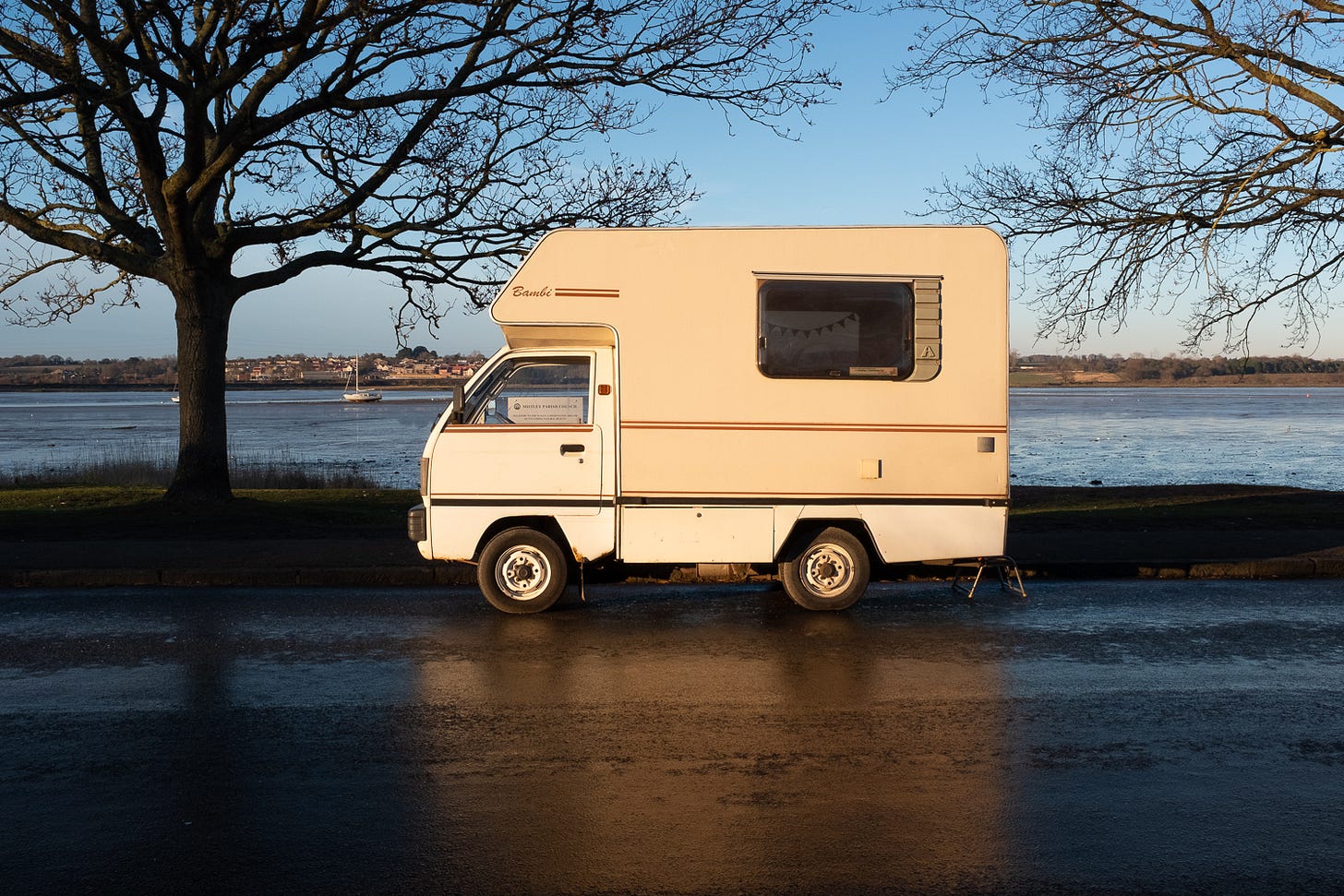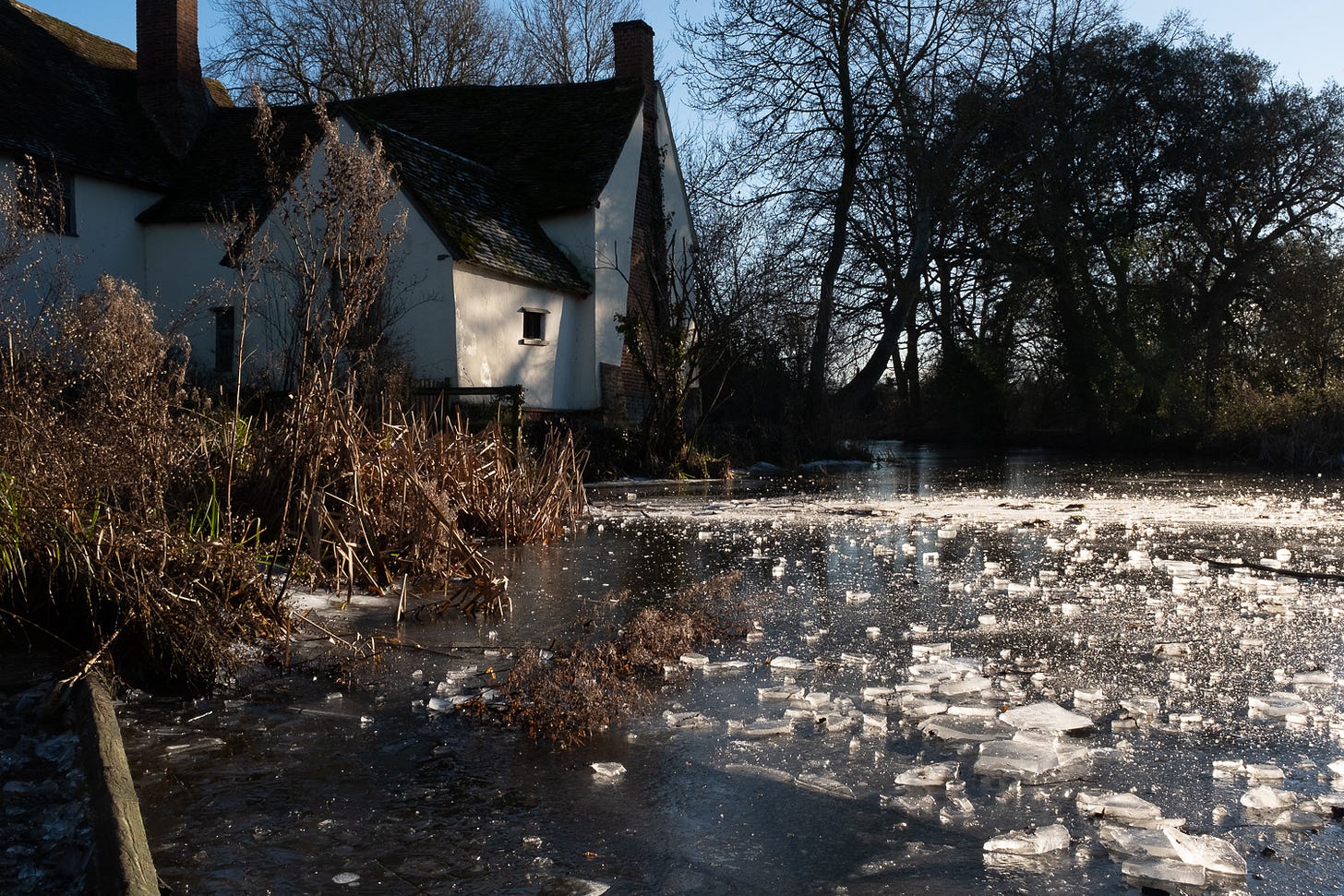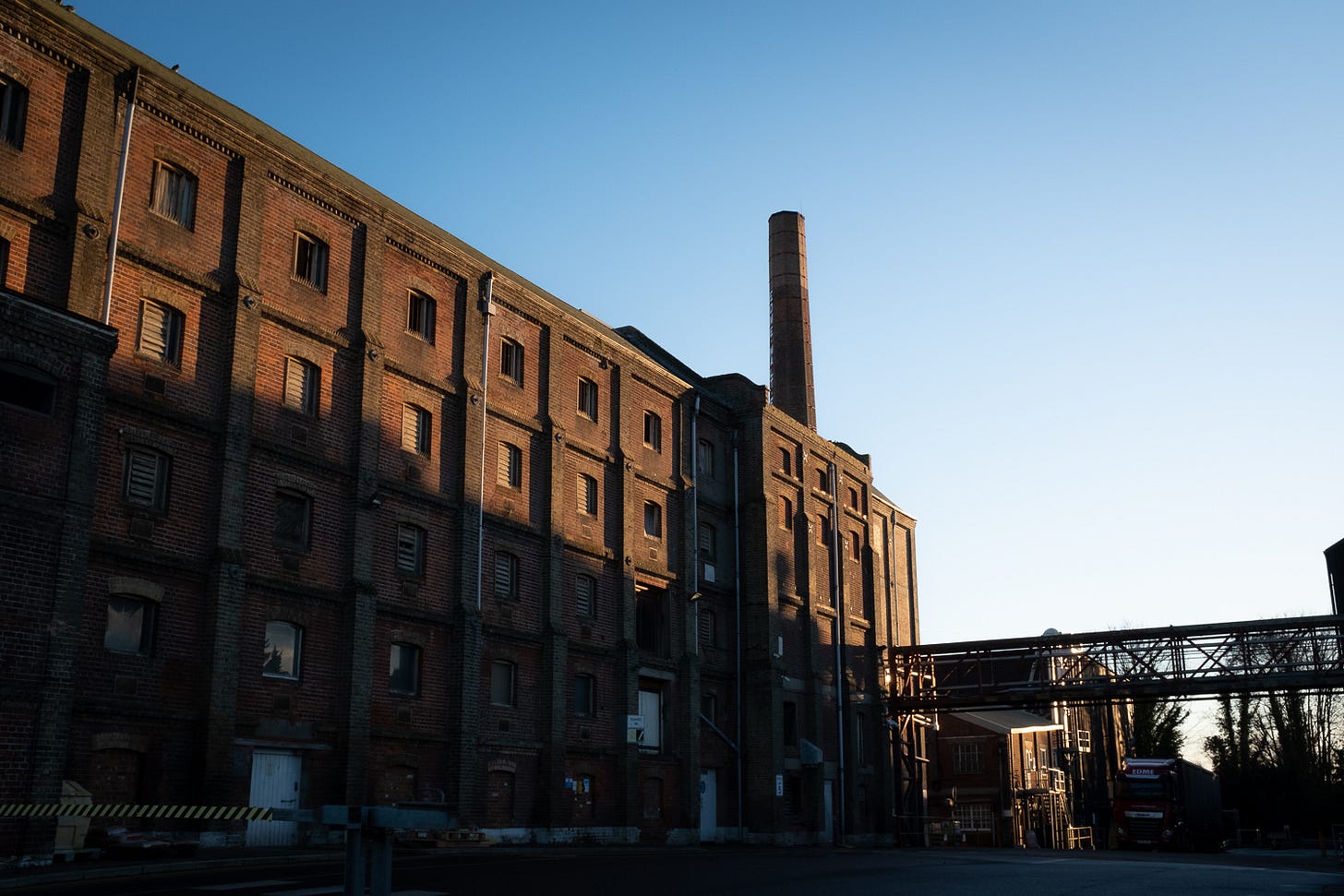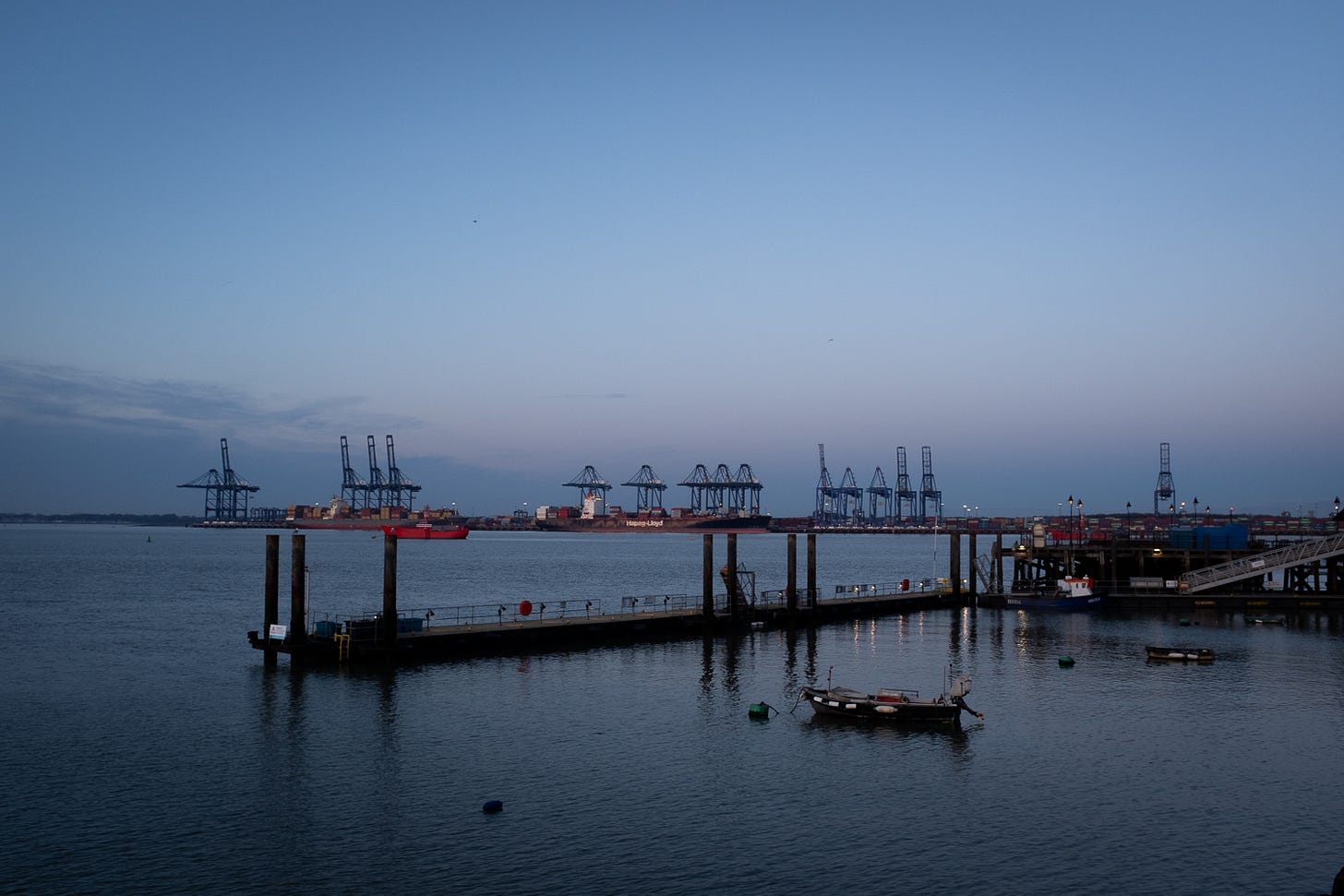A house was crooked with age, slumped in the village like a drunk on a barstool. It was quiet but for the steady rush of the dual carriageway. I walked out and towards Dedham, walking along the road through the lowlands of the River Stour. Half Essex, half Suffolk. Tiny trenches of furrowed brown fields stretched up to the tiny hills either side of the road. The bare-boned oaks covered in ivy looked like hairy topless men.
It was a beautiful day and the approach was quiet. I thought I might have the place to myself but as I got nearer to Dedham I realised I didn’t. It wasn’t that kind of place. A long row of cars parked on the verge. Folks climbed out with wellies and coats. Some had fluffy beanies. From the bridge into town, you could see a thin trail of dots heading along the floodplain, dogs circling.
Dedham is Constable country, as the cliche goes. It’s where the painter was raised, went to school, and made his greatest works. He immortalised it in paintings of rural idyll, boatmen and their pipes, horses splashing through streams, distant church spires pinnacles above the oaks. His world was one of gentleness, a mild-mannered paradise. His paintings make you want to live there. They make you sad our world’s all modern. But they’re paintings of a world that probably never existed.
Dedham has been turned into a town from Constable’s world. It’s a potted idyll, like a Fortnum and Mason’s hamper. It would be wonderful, like many towns are, if it didn’t feel so conscious of itself. Now it feels fake.
It’s now a place for tourists full of unnecessary signs and very necessary car parks. A timber-framed pub that had “Traditional Country Pub” written down the side. An overly quaint eatery with a big sign saying “16th Century Tea House”, as if it’s showing off to the 17th century one nearby. A little further down the road, there was a house that said simply “Private House”.
The church was the focal point and all the signs watched it. Inside a Constable painting of the Ascension hung high on the wall. One of the pews commemorated the notable Dedham emigrants who founded Dedham, Massachusetts. Perhaps unsurprisingly, that Dedham has the oldest timber house in North America. It’s a museum now too.
I walked out of town towards Flatford, over the meadows and past a secluded wealth management firm. Away from the village, a woman stood with her arms out, eyes closed facing the sun. Her husband watched her without speaking. A bit further on I heard to whiney whizz of a drone racing over the hedgerows. There was a group standing in the field and a man sitting cross-legged with a headset on. He had a wide-mouthed gape. “The drone’s got a camera on it,” his friends told me, “He’s filming the whole thing.” The man in the headset didn’t stir and his friends all looked bored. They obviously wanted a go. So did I to be fair.
I came up the path into Flatford, a tiny hamlet on the Stour where Constable painted the Haywain. There was a National Trust cottage with a thatched roof and a queue for the tea rooms. You could hardly get a more English scene. There’s only one thing more English than a queue - saying how English a queue is. I avoided it and walked up the lane to Flatford Mill and Willy Lotts Cottage.
There was nobody there. Visitors seemed to make it no further than the tea rooms so I had the Haywain scene to myself. The pool in front of the cottage was frozen solid, the sun jumped through the chunks of ice kids had strewn across it.
It didn’t look much like the painting. There were resemblances - the building was the same - but the occasional kagooled walker was nothing on the washerwoman, the tangled trees had none of the order of Constable’s, and there was no sweeping vista across golden meadows. It was like seeing somewhere they used in a movie set. The real thing never looks as good as the reproduction because, in short, it’s real. Nevertheless, Flatford Mill that day didn’t look half bad.
I caught a ride down a single-track lane. A burly bloke hopped out of a van and chucked some stuff in the back, cramming me into the middle seat. The driver was called Aleks, the other Tim. They’d come to spend a couple of days walking. “Burn off the Christmas fat!” Tim laughed heartily. It would have been nice if they’d burnt off a bit more, I could hardly breathe in the middle.
Tim loved it around there. Every wind of the lane he’d look out and marvel at a church or a view. “Wow look at that!” he’d extol with a point. Aleks didn’t say much. He had blue sunglasses on and was from Romania originally. He’d been here 20 years. “He’s one of the ones who survived!” Tim laughed heartily again, taking a few moments to mock Brexit. The two of them ran a commercial cleaning company, hence the toilet roll in the back they said, not that I’d noticed it. They’d managed to stay open during the pandemic and in fact, had done quite well from it. People needed more places cleaned, business had boomed.
It wasn’t far to Manningtree and we were there in not much more than 10 minutes. Tim told me they’d walked through it the day before, stopping in a lovely pub on the edge of town.
“That was a strange event…!” Marvin nodded in agreement. “It was eerily empty in there. We got chatting to the barman and it turned out he’d run it for 30 years. It had always been busy until a couple years back he put up an All Lives Matter flag out the front and been a bit vocal about his Brexit views. Now nobody goes in there!” He laughed his hearty laugh.
The men dropped me in Manningtree. It’s a bigger town than Dedham, and sits on the Stour Estuary. It’s where the Witchfinder General did most of his finding in the 17th Century. During two prolific years, Matthew Hopkins sentenced over 100 women to death for witchcraft. Today, the town is beautiful and had none of the model tweeness of Dedham.
The sun was getting low over the muddy flats and I walked alongside the river. Tall chimney stacks, relics of industry, caught the light like torches. I went through Mistley and past the Malt factory. It was a huge red brick thing that gives you industrial vertigo. The malt company that built it 140 years ago still run it today. I passed the pub Gary had told me about. There was no flag outside. It was closed.
I got a lift on towards Harwich, the town at the end of the fingernail peninsular. It was with a Zimbabwean woman called Mary. She had a soft accent and fine grey hair like a cloud. She spoke quietly and told me how she’d been this side for 5 years with her daughter. She taught in a school a couple of days a week and her daughter loved riding.
Mary didn’t let herself miss Zimbabwe but she obviously did. They’d been back this summer to go to the bush as they did every year they could. She said she would spend forever in the bush if she could.
The schools in Britain aren’t as good Mary didn’t think and young people don’t have much respect for the old either. “It’s baffling,” she whispered, “People can be so rude.”The stretch along the estuary, I agreed, certainly was but probably nothing on Zimbabwe. “Well, you can’t keep comparing Zimbabwe and England,” Mary said wistfully, “Otherwise you’ll never be happy.”
We got to Harwich as it was getting dark. The dock’s huge cranes silhouetted themselves against the blue glow of evening. Felixstowe was just across the water and Harwich had its own huge port too. Behind some barbed wire there were a load of brand new Range Rovers, just arrived. Harwich had a naval feel. Swaggering customs houses, lighthouses and an old fort. The buildings had peeling paint and the streets were dark and scary. It felt like it had a rough edge.
I watched the football in a pub with an acidic pint of ale. The other punters grumbled about the price of pies and pints at football stadiums these days but Arsenal beat Man U which made most of them happy, including me.
It was getting late so I slipped out of the pub, ducked through the streets, and made my way back.










